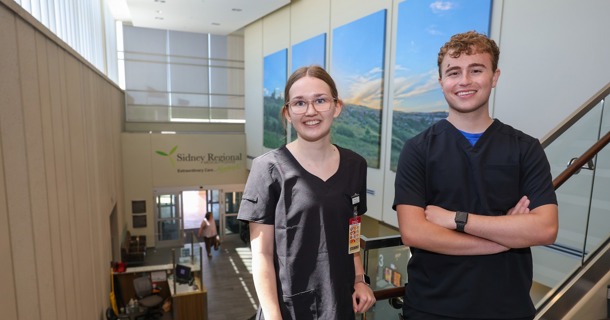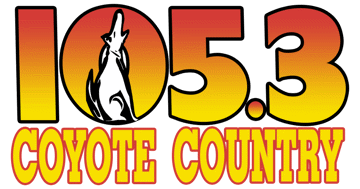Rural Immersion Program brings UNK Health Science Students to the Communities That Need Them

SIDNEY – Brodie Mitchell and Alexys Hurt sat at a table inside a cozy coffee shop just off Interstate 80, sipping specialty drinks and discussing their decision to pursue a health care career.
The University of Nebraska at Kearney students talked about their desire to help others and make a positive impact on their communities.
“It’s a very challenging career, but yet a very gratifying one,” said Mitchell, a sophomore from Cambridge in the pre-medicine program. “When you can directly see how your work is improving somebody’s life, that’s something that’s just so rewarding.”
Mitchell wants to practice family medicine with obstetrics, allowing him to care for patients of all ages. Hurt plans to work in radiologic technology, another of the 20-plus pre-professional programs offered by UNK Health Sciences.
“There’s such a wide variety of options in health care,” the sophomore from Dannebrog said. “You can go into a lot of things. It’s not just one specific career path.”
Both UNK students are part of the Health Science Club and Kearney Health Opportunities Program (KHOP), a collaboration with the University of Nebraska Medical Center that provides scholarships, academic support and professional development activities for Lopers who plan to practice health care in rural communities.
“Being from a small town, I know what rural hospitals do for communities,” Hurt said. “It’s a completely different experience from larger hospitals. In a rural hospital, you can do a lot more and you build more personal connections with patients because you’re in a smaller community. That’s a big part of why I want to stay rural.”
“I think there’s something to be said about the camaraderie that you build in a small town,” Mitchell added. “You’re not just another doctor. I want those personal relationships with my patients, because I feel like that makes everything much more gratifying and rewarding.”
They heard the same comments during a recent trip to Sidney, population 6,400.
TRANSFORMATIVE EXPERIENCE
Mitchell and Hurt spent five days in the western Nebraska community while participating in the new Rural Immersion Program.
Available to any UNK health science student, this innovative program gives Lopers an opportunity to experience rural health care firsthand, going well beyond the traditional networking events and hospital tours. Participants are exposed to numerous aspects of the profession – administration, laboratory services, emergency department, surgery, radiology and pharmacy, to name a few – allowing them to see how these individuals work together to care for patients.
Julie Calahan, engagement and retention coordinator for UNK Health Sciences, calls it a “transformative learning experience.”
“The Rural Immersion Program is a unique opportunity for our students to gain valuable insights and experiences that go beyond the classroom,” she said. “Students are able to connect with health care providers and participate in hands-on experiences, and they’re also able to learn more about the hospital and community as a whole.”
The program launched in January 2024, when two students spent time in McCook and shadowed at Community Hospital, which hosted another student last month. A total of five UNK students will participate through Sidney Regional Medical Center this summer, including Mitchell and Hurt.
“Our goal is to help with workforce demand across the state,” Calahan said. “When we place students in these communities for a longer period of time, they have a more in-depth opportunity to be engaged and learn about the dynamics of the hospital. They also have an opportunity to meet with community leaders and learn about local initiatives.
“When they finish their professional school and are ready to start their career, they have these connecting points back to these rural communities. Our hope is that they look back at those experiences where they really connected with a community and ultimately decide to live and work there.”
FILLING A NEED
With more than 900 undergraduate students currently enrolled in UNK Health Sciences, the Rural Immersion Program could serve as an important recruiting tool for hospitals that are struggling to fill their workforce needs.
There’s an urgent demand for more health care professionals in communities across Nebraska, and Sidney is no exception.
Jason Petik, chief executive officer at Sidney Regional Medical Center, called the current shortage “scary as hell.”
“We have a workforce that unfortunately went through a pandemic in the last four years and that really hit us hard,” he said. “We’re really struggling to replace the people we lost.”
With roughly 400 employees and an annual payroll over $55 million, SRMC remains an economic driver for the region and, more importantly, a necessity for the people living there. It’s the second-largest critical access hospital in the state, providing services that would otherwise be a 90-minute drive away.
During their visit, the UNK students got to see a long-term care addition scheduled to open in September and they heard about plans to build a new cancer center. The current SRMC facility was completed in 2015, so it’s also a sign of the progress happening there.
“Sidney has a lot of great things going for it,” Petik said. “Yes, it is rural, and we don’t have access to absolutely everything all of the time. But we do have a very tightknit community and a very positive culture. We’re trying to grow.”
And they want UNK graduates to be part of that growth.
SRMC and more than a dozen other providers are part of UNK’s Hospital Partners program. Representatives traveled to Kearney for the first-ever Hospital Partners Networking Event in February and a group of KHOP students visited the Sidney hospital later in the semester.
Obviously, Petik hopes these interactions lead to employment offers down the road. But he also understands the importance of promoting rural health care across the state.
“We want to help them recognize that they can have a huge impact on people’s lives in health care, and it doesn’t have to be in Lincoln or Omaha,” Petik said. “It can be in Holdrege. It can be in Imperial. It can be in Gordon. These young adults need to realize that their skill sets are so needed in rural areas.”
BETTER FUTURE
Mitchell’s grandparents live in nearby Lodgepole and his aunt and uncle own and operate a popular ice cream shop in Sidney, so he was already familiar with the community.
Still, he was excited to see health care “from a different perspective.”
“If there’s one thing I’ve learned from job shadowing, it’s that no matter where you go, it’s almost always different,” said Mitchell, who works as a medical scribe at Tri Valley Health System in Cambridge. “Yes, you’re still treating patients, but the structure isn’t always the same.”
He was “really impressed” by SRMC and the amount of community support the hospital receives.
“Listening to them talk about how important patient care is to them and how they’re trying to make it more efficient and effective for people makes me even more excited about where the future of health care is going,” Mitchell said.
Hurt also had a positive experience.
“I really like it,” she said of Sidney. “There’s a lot more than what I thought. When they say a rural town, it’s not really what I expected.”
During a community tour, Cheyenne County Tourism Director Kendra Mitchell showcased life outside the hospital. There’s a vibrant downtown with a historic steakhouse, fancy boutique, unique bicycle shop, “the cutest” two-screen movie theater and numerous other businesses. The Downtown Sounds outdoor concert series is hosted there each summer and there’s an ongoing effort to establish a “creative district” supporting similar activities and events.
Sidney also has a stunning golf course, beautiful parks and trails and easy access to outdoor adventures in Nebraska, Colorado and Wyoming. The community is just 100 miles from Cheyenne and 170 from Denver for those who want “a little dose of city.”
A past chairwoman on the Cheyenne County Chamber of Commerce Board of Directors, Kendra Mitchell and her now-husband moved there from Fort Worth, Texas, more than a decade ago to work for Cabela’s. Although the outdoor retailer is no longer headquartered in Sidney, the young couple stayed because they love the close-knit community.
“You don’t have to live in a big city to have a full life,” she said. “You can pursue a pretty adventurous career here in our small community.”
Julie Slagle agrees.
The vice president of patient care services at SRMC has lived in Sidney for nearly three decades, serving as director of staff development at a local care center and teaching nursing classes at Western Nebraska Community College before joining the hospital 13 years ago.
She describes Sidney as a “family” that takes care of each other.
“If you spend time here, you understand the importance of the hospital to the community and you understand the importance of the community to western Nebraska,” Slagle said. “You get immersed in everything we have to offer and really get a feel for how friendly this community is.”
That message wasn’t lost on the visiting UNK students.
“These critical access hospitals in rural communities, they want you here,” Brodie Mitchell said. “They want to show you what they’re all about because they want you to come work for them someday.”
“By spending the whole week here, I get to know these people and they get to know me,” he added. “Networking is a huge part of finding a job anymore, and it’s all about who you know. So the more people you know, the more options you have, the better set up you are for a future career.”
UNK Health Sciences plans to continue growing the Rural Immersion Program, with Cozad Community Health System joining in January and other hospital partners likely to follow.
“I want to be able to offer two to three Rural Immersion Programs every year for students to take advantage of,” Calahan said. “We’ll continue to make sure this is another resource for them so they can get the most out of their learning experience.”
